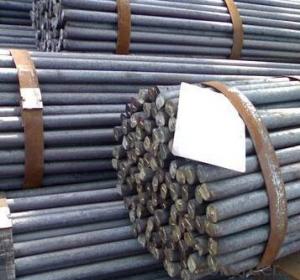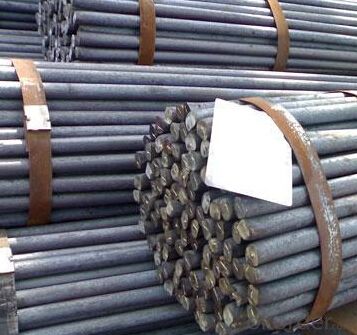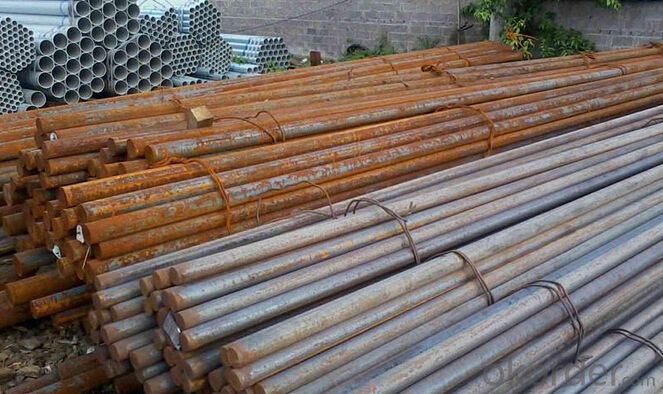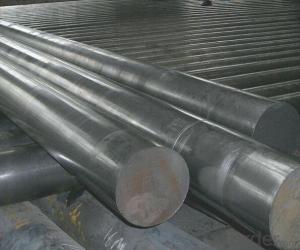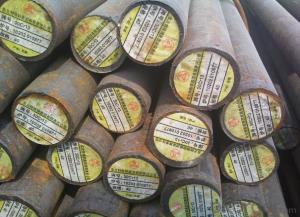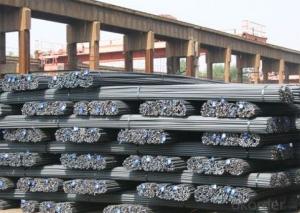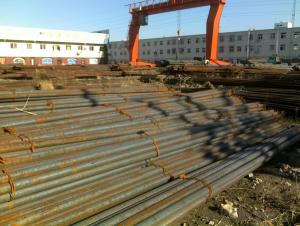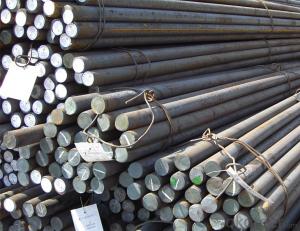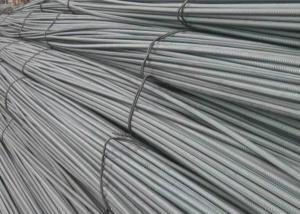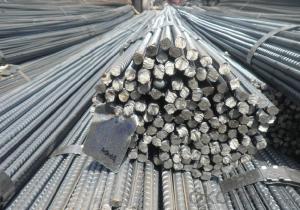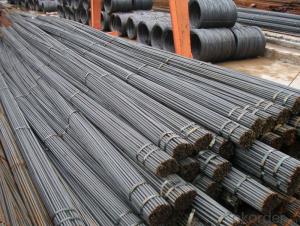Special Steel Reinforcing Steel Bars HRB355 Rebars
- Loading Port:
- China main port
- Payment Terms:
- TT OR LC
- Min Order Qty:
- 30 m.t.
- Supply Capability:
- 10000 m.t./month
OKorder Service Pledge
OKorder Financial Service
You Might Also Like
Specification
Product Information
Chemical composition
Grade | Technical data of the original chemical composition (%) | |||||
C | Mn | Si | S | P | B | |
HRB335 | ≤0.25 | ≤1.60 | ≤0.80 | ≤0.045 | ≤0.045 | >0.0008 |
Physics capability | ||||||
Yield Strength (N/cm2) | Tensile Strength (N/cm2) | Elongation (%)
| ||||
≥335 | ≥490 | ≥16 | ||||
3.Theorectical weight
Diameter (MM) | Cross Sectional Area (MM2) | Theorectical Weight (KG/M) | Weight of 12M Bar (KG) | A Ton Contains 12M Bars (PCS) |
6 | 28.27 | 0.222 | 2.664 | 375.38 |
8 | 50.27 | 0.395 | 4.74 | 210.97 |
10 | 78.54 | 0.617 | 7.404 | 135.06 |
12 | 113.1 | 0.888 | 10.656 | 93.84 |
14 | 153.9 | 1.21 | 14.52 | 68.87 |
16 | 201.1 | 1.58 | 18.96 | 52.74 |
18 | 254.5 | 2 | 24 | 41.67 |
20 | 314.2 | 2.47 | 29.64 | 33.74 |
22 | 380.1 | 2.98 | 35.76 | 27.96 |
25 | 490.9 | 3.85 | 46.2 | 21.65 |
28 | 615.8 | 4.83 | 57.96 | 17.25 |
32 | 804.2 | 6.31 | 75.72 | 13.21 |
36 | 1018 | 7.99 | 98.88 | 10.43 |
40 | 1257 | 9.87 | 118.44 | 8.44 |
Product Show
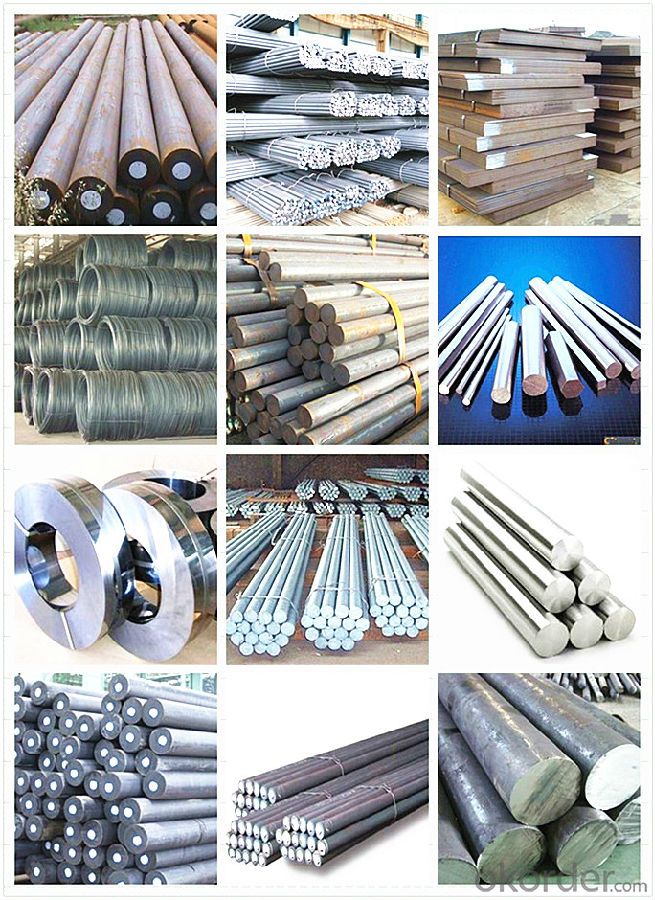
Workshop Show
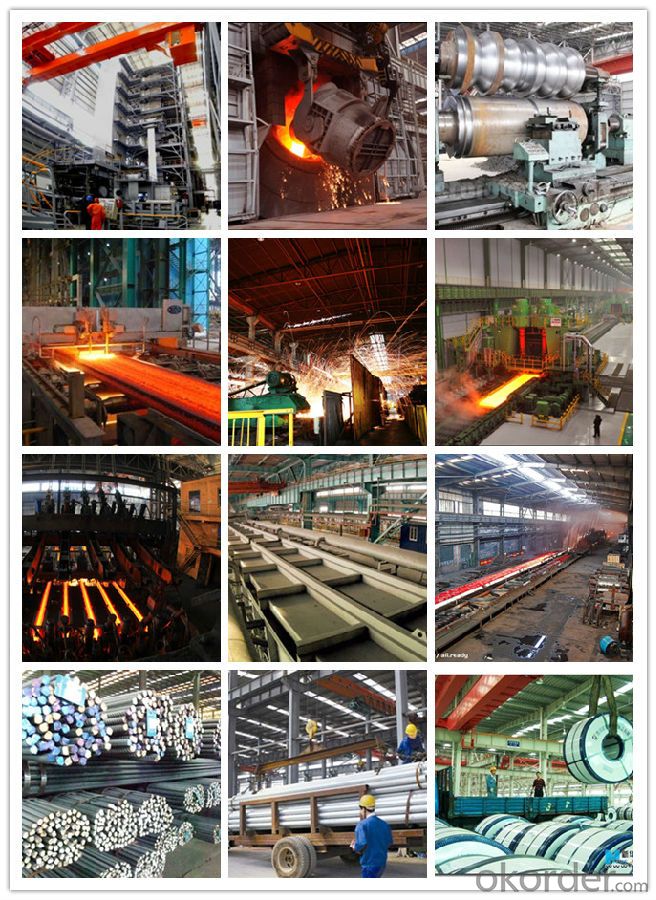
Shipping
1. FedEx/DHL/UPS/TNT for samples, Door-to-Door;
2. By Air or by Sea for batch goods, for FCL; Airport/ Port receiving;
3. Customers specifying freight forwarders or negotiable shipping methods!
Delivery Time: 3-7 days for samples; 5-25 days for batch goods.
Payment Terms
1.Payment: T/T, L/C, Western Union, MoneyGram,PayPal; 30% deposits; 70% balance before delivery.
2.MOQ: 1pcs
3.Warranty : 3 years
4.Package Informations: 1) EXPORT, In 20 feet (GW 25 ton) or 40 feet Container (GW 25 ton)
2)as customer's requirement
Why choose us?
(1) The leading exporter in China special steel industry.
(2) Large stocks for various sizes, fast delivery date.
(3) Good business relationship with China famous factories.
(4) More than 7 years steel exporting experience.
(5) Good after-sales service guarantee.
- Q: What grade of iron powder should be used for processing special steel? Are there any other elements on the request? How much are they?
- The main special steel carbon structural steel, carbon tool steel, carbon spring steel, alloy spring steel, alloy structural steel, bearing steel, alloy tool steel, alloy tool steel, high-speed tool steel, stainless steel, heat-resistant steel and high-temperature alloy, precision alloy, gold and other electric heating.
- Q: What are the requirements for special steel used in pharmaceutical manufacturing?
- The requirements for special steel used in pharmaceutical manufacturing include high corrosion resistance, excellent cleanliness and hygiene, resistance to high temperatures and chemicals, and compliance with strict regulatory standards such as Good Manufacturing Practices (GMP). Additionally, the steel must be able to maintain the integrity of the pharmaceutical products, ensuring their purity and preventing contamination.
- Q: What is the role of special steel in sustainable manufacturing?
- Special steel plays a crucial role in sustainable manufacturing by offering numerous advantages that contribute to environmentally friendly production processes. Firstly, special steel is highly durable and has a long lifespan, which reduces the need for frequent replacement or repairs. This durability minimizes waste and extends the life cycle of products, reducing the overall environmental impact. Furthermore, special steel has excellent recyclability properties. It can be recycled multiple times without losing its quality or performance, making it a sustainable choice for manufacturers. By incorporating recycled special steel into the production process, manufacturers can reduce their reliance on virgin materials and decrease energy consumption and greenhouse gas emissions associated with the extraction and production of new steel. Moreover, special steel offers high strength and lightweight characteristics, enabling manufacturers to design products that are more energy-efficient. For example, in the automotive industry, using special steel in the manufacturing of vehicles reduces their weight, leading to improved fuel efficiency and lower emissions. This contributes to the reduction of carbon footprint and supports sustainable transportation. Special steel also plays a significant role in the production of renewable energy technologies. Wind turbines, solar panels, and hydropower systems require sturdy and resilient materials to withstand harsh conditions. Special steel provides the necessary strength, corrosion resistance, and durability required for these renewable energy infrastructure projects. By enabling the development of such technologies, special steel contributes to the growth of the renewable energy sector, which is essential for transitioning to a more sustainable energy mix. In conclusion, special steel plays a vital role in sustainable manufacturing by offering durability, recyclability, lightweight properties, and strength. By using special steel, manufacturers can reduce waste, energy consumption, and emissions, while also enabling the development of energy-efficient products and renewable energy technologies. Incorporating special steel into manufacturing processes is an essential step towards achieving a more sustainable and environmentally friendly future.
- Q: Can special steel be used in automotive engine components?
- Automotive engine components can indeed benefit from the utilization of special steel. Also referred to as alloy steel, special steel possesses enhanced properties, including increased strength, toughness, and heat resistance. These attributes make it highly suitable for the utilization in critical engine components that endure high temperatures, stress, and wear. Within the realm of automotive engines, special steel finds application in an array of components, such as crankshafts, camshafts, connecting rods, valves, and piston rings. These components encounter extreme conditions, including elevated temperatures, pressure, and rotational forces. Special steel confers the necessary strength and durability to withstand these conditions, consequently ensuring dependable engine performance and longevity. The incorporation of special steel within automotive engine components yields several advantages. Firstly, it heightens the strength and load-carrying capacity of the components, enabling them to handle greater power and torque outputs. Secondly, special steel bolsters the fatigue resistance and durability of the components, thereby diminishing the likelihood of failure and prolonging their service life. Lastly, special steel exhibits the ability to endure the high temperatures and thermal cycling experienced within the engine, thereby averting deformation and upholding dimensional stability. On the whole, the utilization of special steel in automotive engine components assumes paramount importance in the pursuit of attaining optimal performance, reliability, and longevity. It guarantees that the engine can endure the demanding conditions under which it operates, ultimately granting a smoother and more efficient driving experience.
- Q: How does special steel perform in case hardening applications?
- Special steel performs exceptionally well in case hardening applications. Case hardening is a heat treatment process used to increase the surface hardness of a material while maintaining a tough and ductile core. Special steel, also known as alloy steel, is specifically formulated to have enhanced properties such as high strength, toughness, and wear resistance. In case hardening applications, special steel is ideal due to its ability to form a hard outer layer while retaining its core properties. The process typically involves heating the steel to a specific temperature and then introducing a carbon-rich environment, such as through carburizing or carbonitriding. The carbon atoms diffuse into the steel's surface, creating a high-carbon layer, known as the case, which significantly increases hardness and wear resistance. Special steel's high carbon content allows for deeper and more uniform case hardening compared to other types of steel. This results in improved durability, reduced friction, and enhanced resistance to wear, abrasion, and impact. The tough core of special steel also ensures that the material remains resistant to cracking or fracturing under high stress or impact loads. Additionally, special steel offers excellent machinability, allowing for ease of processing during case hardening applications. This makes it a preferred choice for various industries, including automotive, aerospace, tooling, and manufacturing, where components require both high surface hardness and structural integrity. Overall, special steel is highly regarded for its exceptional performance in case hardening applications. Its combination of high strength, toughness, wear resistance, and machinability makes it an excellent choice for producing durable and reliable components that can withstand demanding operating conditions.
- Q: How does spring steel maintain its elasticity?
- Spring steel maintains its elasticity due to its unique composition and heat treatment process. It is made from a high carbon steel alloy, which provides it with exceptional strength and flexibility. Additionally, spring steel undergoes a specific heat treatment called quenching and tempering. During this process, the steel is heated to a high temperature and then rapidly cooled, which creates a hardened structure. This hardened structure allows spring steel to withstand repeated bending and twisting without permanently deforming. Overall, the combination of high carbon content and heat treatment enables spring steel to maintain its elasticity and resilience.
- Q: What are the characteristics of tool steel?
- Tool steel is a type of high-carbon steel that possesses exceptional hardness, durability, and resistance to wear and deformation. It is specifically designed to be used in various cutting, shaping, and forming tools. Some common characteristics of tool steel include high strength, excellent heat resistance, good toughness, and the ability to hold a sharp edge even under extreme conditions. Additionally, tool steel often has good machinability and can be easily heat treated to enhance its properties for specific applications.
- Q: What are the different methods of protecting special steel against corrosion?
- There are several methods of protecting special steel against corrosion. These include applying protective coatings such as paints or epoxy, using sacrificial anodes or cathodic protection to redirect corrosion, employing corrosion inhibitors, and utilizing stainless steel or alloyed steel with higher corrosion resistance. Additionally, proper maintenance and regular inspections can help identify and address any potential corrosion issues early on.
- Q: What are the mechanical properties of special steel?
- Enhanced mechanical properties are possessed by special steels, also known as alloy steels, in comparison to regular carbon steels. These properties differ based on the concentration and specific alloying elements. Some common mechanical properties of special steel are as follows: 1. High tensile strength: Special steels are recognized for their exceptional strength, making them suitable for applications requiring high load-bearing capacity. The tensile strength of these steels can vary from 500 MPa to over 2,000 MPa, depending on the composition. 2. Improved hardness: The inclusion of alloying elements in special steels can significantly increase their hardness. This property is desirable for applications that demand resistance to wear and abrasion. Special steels can achieve hardness levels ranging from 200-600 HB (Brinell hardness), depending on the specific alloy composition and heat treatment. 3. Good toughness: Special steels commonly exhibit good toughness, which refers to their ability to absorb energy before fracturing. This property is crucial for components subjected to impact or dynamic loading. The combination of high strength and toughness makes special steels suitable for demanding applications such as automotive parts or industrial machinery. 4. Excellent fatigue resistance: Special steels are engineered to withstand cyclic loading without failure. They display enhanced fatigue resistance, enabling them to endure repeated stress cycles without compromising their structural integrity. This property makes special steels ideal for critical components in the aerospace, automotive, and machinery industries. 5. Superior corrosion resistance: Depending on the alloy composition, special steels can offer improved corrosion resistance compared to regular carbon steels. The addition of elements like chromium, nickel, or molybdenum aids in the formation of protective oxide layers on the surface, preventing corrosion and increasing durability. 6. High temperature resistance: Certain special steels are specifically formulated to perform well at elevated temperatures. They possess excellent heat resistance and can retain their mechanical properties even under extreme temperatures. This property is crucial for applications such as turbine blades, exhaust systems, or high-temperature furnaces. It is important to note that the specific mechanical properties of special steel can vary significantly depending on the specific alloy composition, heat treatment, and processing techniques employed. Therefore, it is essential to consult the material specifications or seek expert advice to determine the exact mechanical properties of a particular special steel.
- Q: What is the role of chromium in special steel?
- Chromium plays a crucial role in special steel due to its unique properties and characteristics. It is primarily added to steel alloys to enhance their corrosion resistance, durability, and strength. One of the significant contributions of chromium is its ability to form a passive oxide layer on the surface of steel, known as chromium oxide. This oxide layer acts as a protective barrier, preventing the underlying steel from coming into contact with corrosive elements such as oxygen and moisture. This corrosion resistance makes chromium-containing steel highly suitable for applications in harsh environments, such as marine or chemical industries, where the material is exposed to corrosive agents. Furthermore, chromium also improves the mechanical properties of steel. It increases the steel's hardness, toughness, and wear resistance. This makes it valuable in manufacturing tools, machinery components, and other applications that require high strength and durability. Chromium also helps in retaining the steel's sharpness and edge retention, making it ideal for making high-quality knives and blades. Additionally, chromium is essential in heat-resistant steel alloys, as it significantly improves the material's ability to withstand high temperatures without losing its strength or shape. This makes it suitable for various applications, including turbine blades, exhaust systems, and aerospace components. In summary, chromium plays a vital role in special steel by enhancing its corrosion resistance, improving mechanical properties, and enabling it to withstand high temperatures. These properties make chromium-containing steel alloys highly versatile and valuable in a wide range of industries and applications.
Send your message to us
Special Steel Reinforcing Steel Bars HRB355 Rebars
- Loading Port:
- China main port
- Payment Terms:
- TT OR LC
- Min Order Qty:
- 30 m.t.
- Supply Capability:
- 10000 m.t./month
OKorder Service Pledge
OKorder Financial Service
Similar products
Hot products
Hot Searches
Related keywords
